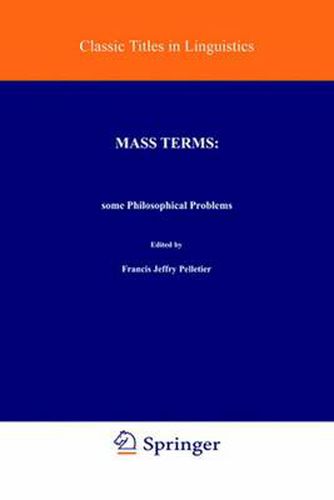Readings Newsletter
Become a Readings Member to make your shopping experience even easier.
Sign in or sign up for free!
You’re not far away from qualifying for FREE standard shipping within Australia
You’ve qualified for FREE standard shipping within Australia
The cart is loading…






This title is printed to order. This book may have been self-published. If so, we cannot guarantee the quality of the content. In the main most books will have gone through the editing process however some may not. We therefore suggest that you be aware of this before ordering this book. If in doubt check either the author or publisher’s details as we are unable to accept any returns unless they are faulty. Please contact us if you have any questions.
I. MASS TERMS, COUNT TERMS, AND SORTAL TERMS Central examples of mass terms are easy to come by. ‘Water’, ‘smoke’, ‘gold’, etc. , differ in their syntactic, semantic, and pragmatic properties from count terms such as ‘man’, ‘star’, ‘wastebasket’, etc. Syntactically, it seems, mass terms do, but singular count terms do not, admit the quantifier phrases ‘much’, ‘an amount of’, ‘a little’, etc. The typical indefinite article for them is ‘some’ (unstressed)!, and this article cannot be used with singular count terms. Count terms, but not mass terms, use the quantifiers ‘each’, ‘every’, ‘some’, ‘few’, ‘many’; and they use ‘a(n)’ as the indefinite article. They can, unlike the mass terms, take numerals as prefixes. Mass terms seem not to have a plural. Semantically, philo sophers have characterized count terms as denoting (classes of?) indi vidual objects, whereas what mass terms denote are cumulative and dissective. (That is, a mass term is supposed to be true of any sum of things (stuff) it is true of, and true of any part of anything of which it is true). Pragmatically, it seems that speakers use count terms when they wish to refer to individual objects, or when they wish to reidentify a particular already introduced into discoursc. Given a space appropriate to a count term C, it makes sense to ask how many C’s there are in that space.
$9.00 standard shipping within Australia
FREE standard shipping within Australia for orders over $100.00
Express & International shipping calculated at checkout
This title is printed to order. This book may have been self-published. If so, we cannot guarantee the quality of the content. In the main most books will have gone through the editing process however some may not. We therefore suggest that you be aware of this before ordering this book. If in doubt check either the author or publisher’s details as we are unable to accept any returns unless they are faulty. Please contact us if you have any questions.
I. MASS TERMS, COUNT TERMS, AND SORTAL TERMS Central examples of mass terms are easy to come by. ‘Water’, ‘smoke’, ‘gold’, etc. , differ in their syntactic, semantic, and pragmatic properties from count terms such as ‘man’, ‘star’, ‘wastebasket’, etc. Syntactically, it seems, mass terms do, but singular count terms do not, admit the quantifier phrases ‘much’, ‘an amount of’, ‘a little’, etc. The typical indefinite article for them is ‘some’ (unstressed)!, and this article cannot be used with singular count terms. Count terms, but not mass terms, use the quantifiers ‘each’, ‘every’, ‘some’, ‘few’, ‘many’; and they use ‘a(n)’ as the indefinite article. They can, unlike the mass terms, take numerals as prefixes. Mass terms seem not to have a plural. Semantically, philo sophers have characterized count terms as denoting (classes of?) indi vidual objects, whereas what mass terms denote are cumulative and dissective. (That is, a mass term is supposed to be true of any sum of things (stuff) it is true of, and true of any part of anything of which it is true). Pragmatically, it seems that speakers use count terms when they wish to refer to individual objects, or when they wish to reidentify a particular already introduced into discoursc. Given a space appropriate to a count term C, it makes sense to ask how many C’s there are in that space.